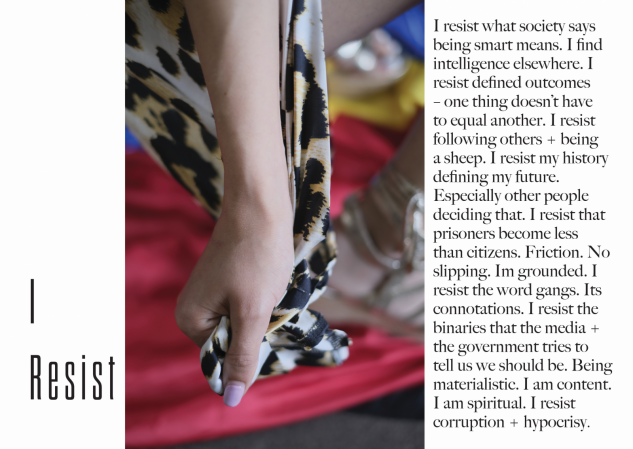Exploring Resistance in Young People Victimised by Interpersonal and Sexual Violence
Imagining Resistance is a three-year creative participatory photography project funded by the Arts and Humanities Council and led by Kristine Hickle (Social Work and Social Care), working with Camille Warrington (University of Bedfordshire) and the visual artist Becky Warnock. The project is exploring how girls and young women (age 13-25) who have experienced sexual violence and exploitation alongside other forms of harm (e.g. criminal exploitation, gang involvement and serious youth violence) engage in acts of resistance. The word ‘resistance’ is loaded with meaning. It has been adopted by activists and consumers and used by researchers in fields such as anthropology and sociology to positively describe how people 'fight back' against oppression and subjugation. However, it is rarely used in direct practice settings to describe acts of 'fighting back' or self-preservation in the context of oppression in relationships - particularly regarding young people. When it is used to describe young people, it has negative connotations: when they ‘resist’ help, resist engagement, resist participating in prosocial activities.
Kristi and her team have explored how creative methods might enable young people’s ways of resistance to emerge. They have also experimented with how visual methods of data production might mediate the intrusive presence of researchers, extend the sometimes tidier boundaries imposed by eliciting verbal narratives, and allow for a process of defamiliarization (in relation to how problems of exploitation and interpersonal violence are framed) for both themselves and the young people participating in the project. To do this, they have partnered with two photographers and three charities that provide services to young people affected by sexual violence and exploitation (based in London and Nottingham).
The creative approach of Imagining Resistance is helping the research team understand how young people’s capacity for agency, their strength, and creative skills for survival have enabled them to carry on in the face of sometimes extreme threat or harm. This is true in instances when they resist relationships and activities that are interpreted by adults to be anti-social and destructive alongside acts of resistance that might be framed as pro-social, healthy, and productive. For example, they have seen the young women represent, through creative activities and the meaning they ascribe to their work, how the strength required to resist being dragged into ‘post code beefs’ and gangs is manifested in the decision to cut ties with an exploitative boyfriend. It is also evident when they refuse to do what a teacher tells them to do, sometimes choosing misbehaviour as an act of resistance against what feels like an impossible request for a young body carrying so much trauma and working so hard to remain self-regulated within environments that simply ask too much of them.
As they move through the final stages of the project, they have been particularly struck by how the young women’s strengths, creativity, and power move between contexts. The have learned that resistance looks like:
- Outsmarting and misdirection
- Proving people wrong
- Resisting binaries
- ‘Creating space to listen to myself’
- Refusing to change for other people
- Showing up to school but refusing to engage because what’s being asked is more than they can give
- Breaking off contact with an abusive and exploitative ex-partner because: ‘he broke me but I fixed myself’
- Or…not breaking up with the partner but believing: ‘you can’t take away from me the fact that I don’t want to be with you’
- Holding onto the predictable routine learned at a mother and baby home amidst a chaotic and challenging relational and geographic contexts: ‘no one thought I would have a routine but I have a routine’
- Choosing to believe ‘I have a right to be the person I want to be…I have a right to a full life’
Kindly supported by an AHRC Research Networking grant

